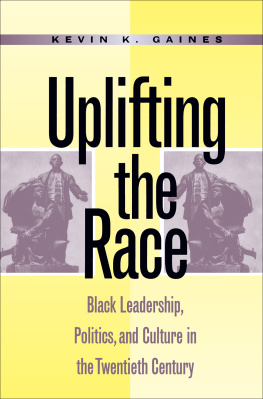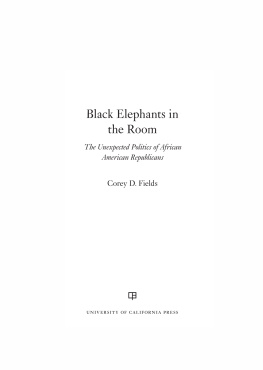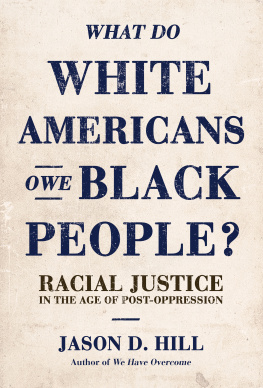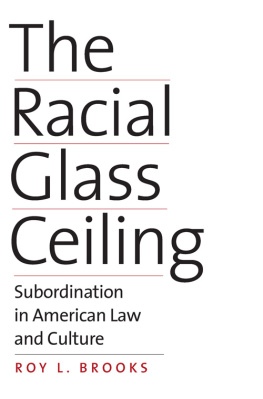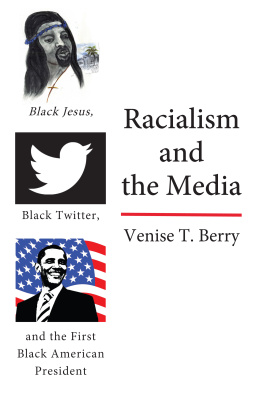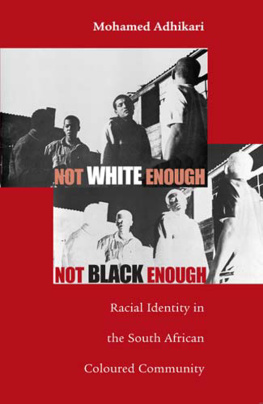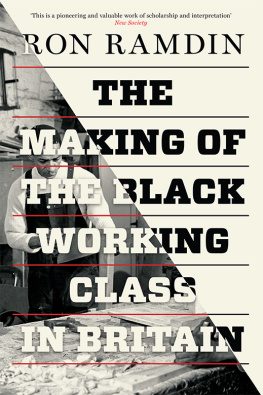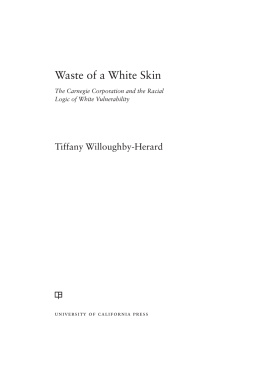UPLIFTING THE RACE
1996 The University of North Carolina Press
All rights reserved
Manufactured in the United States of America
The paper in this book meets the guidelines for permanence and durability of the Committee on Production Guidelines for Book Longevity of the Council on Library Resources.
Library of Congress Cataloging-in-Publication Data
Gaines, Kevin Kelly.
Uplifting the race: Black leadership, politics, and culture in the twentieth century / Kevin K. Gaines.
p. cm.
Based on the authors thesis (Ph.D.)Brown University, 1991.
Includes bibliographical references (p. ) and index.
ISBN 0-8078-2239-6 (cloth: alk. paper).
ISBN 0-8078-4543-4 (pbk.: alk. paper)
1. Afro-AmericansCultural assimilationHistory20th century. 2. Afro-American leadershipHistory20th century. 3. Afro-AmericansPolitics and government. I. Title.
EI85.86.G35 1995
973.0496073dc20 95-7956
CIP
cloth 06 05 04 03 02 6 5 4 3 2
paper 06 05 04 03 02 8 7 6 5 4
An earlier version of part of Chapter 7 appeared as Assimilationist Minstrelsy as Racial Uplift Ideology: James D. Corrotherss Literary Quest for Black Leadership, American Quarterly 45, no. 3 (September 1993): 34169.
THIS BOOK WAS DIGITALLY PRINTED
For my parents,
Melvin and Marilyn Gaines
Contents
PREFACE
The Intersections of Racial Liberalism and Racial Uplift Ideology
INTRODUCTION
Uplift, Dissemblance, Double-Consciousness, and the Ideological Dimensions of Class
1. FROM FREEDOM TO SLAVERY
Uplift and the Decline of Black Politics
2. LIVING JIM CROW
The Atlanta Riot and Unmasking Social Equality
3. FIGURING CLASS WITH RACE
Uplift, Minstrelsy, Migration, and the Negro Problem
4. THE CRISIS OF NEGRO INTELLECTUALS
William H. Ferris and Black Nationalist Thought
5. THE WOMAN AND LABOR QUESTIONS IN RACIAL UPLIFT IDEOLOGY
Anna Julia Coopers Voices from the South
6. URBAN PATHOLOGY AND THE LIMITS OF SOCIAL RESEARCH
W. E. B. Du Boiss The Philadelphia Negro
7. BETWEEN UPLIFT AND MINSTRELSY
Paul Laurence Dunbar, James D. Corrothers, and the Ambivalent Response to Urbanization, 19001916
Illustrations
Convict labor gang, North Carolina, ca. 1910
Lynching, Paris, Texas, ca. 1890
Black soldiers of the Twenty-fourth Infantry in Cuba
Portrait of mother and children, ca. 1920s
Advertising trade card, ca. 1880s
Negro exhibit, American Missionary Association, Boston, ca. 1905
Ida B. Wells, ca. 1890
Statue of Booker T. Washington, Tuskegee Institute
William H. Ferris, ca. 1910
Garveyite family portrait, ca. 1920s
A representation of Ethiopianism from the nineteenth century
Anna Julia Cooper, ca. 1890
Black womens drill team, Wilmington, Delaware, 1905
William Edward Burghart Du Bois, ca. 1910
Paul Laurence Dunbar, ca. 1900
Alice Moore Dunbar-Nelson, ca. 1900
Preface
The Intersections of Racial Liberalism and Racial Uplift Ideology
In the period between his departure from the Nation of Islam in March of 1964 and his assassination on February 21, 1965, Malcolm X broadened the terms of identity and the tactics of struggle for African Americans. We need to expand the civil-rights struggle to a higher levelto the level of human rights, he argued. Malcolm declared that African Americans should circumvent a federal government reluctant to protect black lives and political rights in the South and bring their grievances to the United Nations as a human rights issue: Civil rights means your asking Uncle Sam to treat you right. Human rights are something you were born with. Human rights are your God-given rights.... And anytime anyone violates your human rights, you can take them to the world court.
Malcolm voiced the growing disenchantment within the black freedom movement with federal reluctance to protect black and white demonstrators against segregationists state-sanctioned terror. Civil rights legislation did not protect African Americans in the South from such abuses. Nor did these reforms address the poverty and discrimination suffered by blacks in urban ghettoes. Central to Malcolms critique of civil rights was a changing black consciousness and politics joining struggles for racial and social justice. Malcolm questioned the Cold War liberalism that held sway over the civil rights consensus, with its injunctions that black leadership attend solely to formal equality before the law and remain silent on economic issues and U.S. foreign policy. Reframing black Americans struggles within the international context of African liberation movements, Malcolm asserted the citizenship and humanity of African Americans as unassailable first principles.
Malcolms critique is a sobering reminder that the civil rights movement fell short of its promise of racial justice in the courts and might have gone on to address disparities in the distribution of wealth and power. Through the post-civil rights, neoliberal ideology of color blindness, race continues to
Today we face the paradoxes of persistent racism amidst claims of color blindness. The expansion of the black middle class amidst deepening poverty and social disintegration in black communities is equally unsettling, as many black citizens continue to bear the brunt of joblessness, recession, and inadequate schools. Nostalgic mass-media narratives of civil rights try to deflect these crises by dwelling on images of a charismatic, messianic leader, invariably male, and usually martyred. In the meantime, since the 1980s, conservative black leadership has assisted the federal assault on civil rights reforms, maintaining for some the illusion of color-blind fairness. No wonder that many middle-class African American media spokespersons respond with apparent nostalgia for the era of segregation, interring the memory of Malcolms critique of civil rights. By this shortsighted racial reckoning, in which black ideals of self-help respond to and reinforce the majority societys hostility to federal enforcement of civil rights, integration, antipoverty programs, and the expansion of the black middle class have produced a culture of poverty, ending a golden age of supposedly healthy black communities during the era of de jure segregation.
There is a clear relationship between post-civil rights neoliberal claims of a color-blind society and the enlistment by the federal government of black conservatives, aided by the confused responses of mounting black anger and disaffection with civil rights and of nostalgia for segregation and self-help. Documentary media remembrances of the civil rights era recycle the dream of a charismatic leader as if to avoid confrontation with the enduring nightmares of racism, joblessness, and social misery. For many blacks, this master narrative of civil rights signals a sense of malaise, exemplified in the mass-media lament over the disappearance of role models. Such mythologizing represses the democratic, anti-imperialist agenda that Malcolm X and Martin Luther King were evolving when they were slain, and which W. E. B. Du Bois and Paul Robeson had pursued until they were branded nonpersons at the height of the repression of civil rights and civil liberties during the Cold War.
This book examines the historical circumstances that have led us to the post-civil rights media spectacle of posthumous black messianic leadership. The search for the origins of racial liberalism, civil rights, the myth of color blindness, and the reactive black messianism that circumscribes black struggle and distorts its history leads us back to the turn of the century. Even the most seemingly principled expressions of liberalism from that period were not immune to racism. In his dissent to

